What is Asthma?
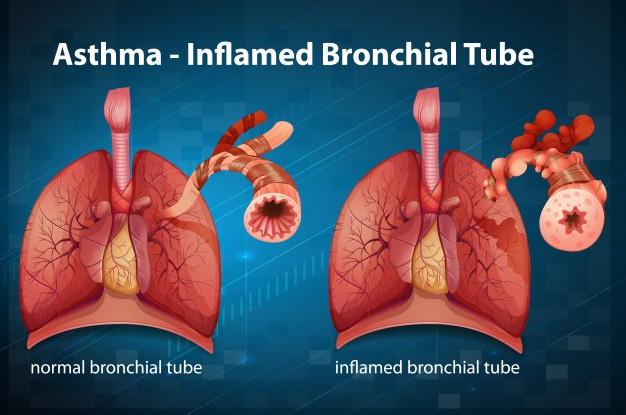
(Source: Freepick.com)
Asthma is an inflammatory disease associated with the respiratory tract. During asthma, the airway lining of the lungs becomes inflamed and swollen. Further, excess mucus production occurs and spasm of the muscles of the respiratory tract occurs. Finally, this results in reduced airflow and difficulty in breathing. These disturbances lead to appear symptoms of asthma. The most prominent symptoms of asthma include as mentioned below.
- shortness of breath
- tightness in the chest
- coughing especially at night
- wheezing or whistling sound at breathing
- fatigue
- breathlessness
- Increased respiratory rate
According to the severity of the symptoms, asthma can be classified into 4 categories. They are mild intermittent asthma, mild persistent asthma, moderate persistent asthma, and severe persistent asthma. The severity of asthma can be managed by identifying its symptoms at a mild level. (1), (2), (3)
Types of Asthma
The experts have classified different types of asthma for the easy of understanding. They are as follows.
- Allergic asthma
- Non-allergic asthma
- Exercise-induced asthma
- Adult-onset asthma
- Nocturnal asthma
- Occupational asthma
- Asthma in children
- Status asthmaticus
- Aspirin-induced asthma
Asthma trigger factors
Symptoms of asthma can be worsened by environmental factors called “asthma trigger factors”. Avoiding trigger factors is the best way to manage asthma. The most common trigger factors of asthma include the following.
- Allergens like pollen, pet dander, mold, and dust mites
- Changes in weather like humidity and temperature changes
- Exercise
- Infections like colds, sinusitis, and flu
- Strong odors or perfumes
- Irritants like tobacco smoke, paints, cleaning solutions, and air pollution
- Strong emotions like stress, anxiety, laughter, and crying
- Medications like asthma
Actually there is no cure for asthma, but can be managed properly. Nearly 5-10% of the world population or 23.4 million persons including 7 million children are affected by asthma. Estimates of world health organization reported that 250,000 people die due to asthma. Many of these deaths are avoidable with proper treatment and care. Adults are four times more prone to die from asthma than children. (4),(5)
Best Food Choices
Foods including flavonoids, magnesium, mono-unsaturated fatty acids, vitamin A, vitamin C, and vitamin D are importantly helpful to reduce the allergic symptoms of asthma.In an asthmatic attack, trigger factors cause constrict the airways and release histamine which is an inflammatory agent. Histamine promotes the release of mucous making it difficult to breathe. Studies have found that vitamins can neutralize the inflammatory agents by counteracting them. Furthermore, foods with anti-inflammatory agents will be more beneficial to reduce inflammation related to the respiratory tract. Therefore be wise in selecting foods that will ease the respiratory problems. Good dietary practices help to avoid the progression of disease severity. (6)
Study evidence proves that people with poor vitamins and omega-3 fatty acids were more likely to have poor lung function. Another study was done in 2007 shows that children who had a Mediterranean diet at their childhood rich in fruits like apples, grapes, and nuts were less likely to show respiratory complications. (7)
1. Apples

Source: Pexels.com
A study related to pregnant ladies showed that eating more apples during pregnancy help to reduce the risk of asthma and wheezing of their born children. The reason for this effect is the presence of phytochemicals like flavonoids. Apples with peels are high in flavonoid content than apple flesh alone. Furthermore, apples are enriched with antioxidants that fight against inflammatory mediators. The pectin present in apples is digested and fermented by good microflora of the body and stimulate to produce antibodies and white blood cells. They also fight against inflammatory mediators. (7), (8)
2. Avocado
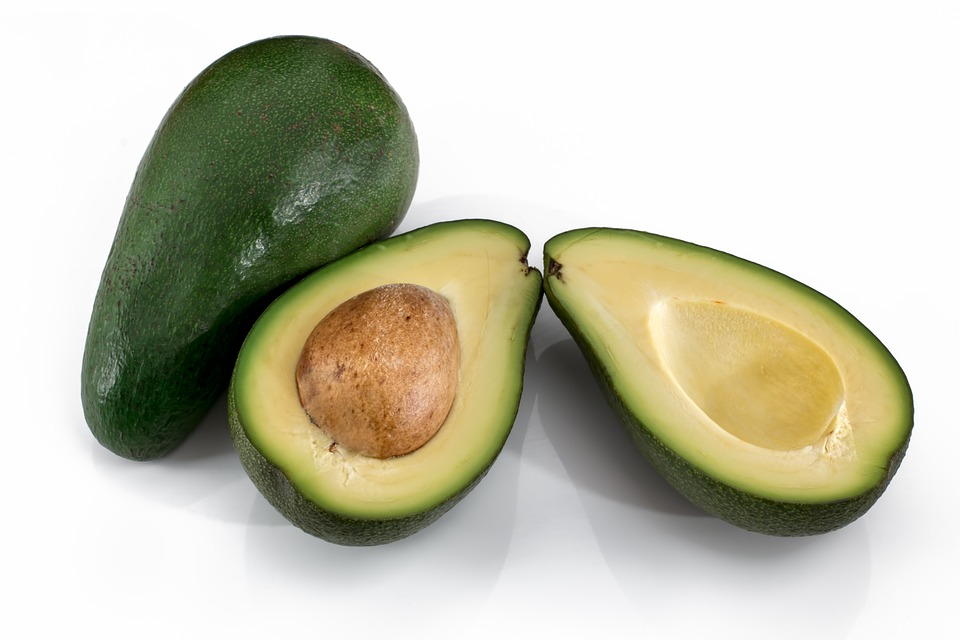
Source: Pixabay.com
Avocado is a food of choice for asthmatic patients to reduce allergic symptoms. It is a good source of mono-unsaturated fatty acids, glutathione, and omega-3 fatty acids. Glutathione scavenges free radicals while omega-3 fats fight against bronchial inflammation and help to alleviate the respiratory discomforts. (9), (10)
3. Carrot

Source: Pexels.com
Importantly carrot has beneficial properties to avoid respiratory complications. These properties are due to the presence of beta-carotene, an antioxidant. Beta-carotene is converted into vitamin A within the body and reduce the incidence of exercise-induced asthma. Also, carrots can expel excess mucus from the body. (11), (12), (13)
4. Green leafy vegetables

Source: Pexels.com
Green leafy vegetables are loaded with vitamin A. These vitamins can neutralize the inflammatory agents like histamine that aggravate the symptoms of asthma. Moreover, eating plenty of green leafy vegetables reduce the production of mucus within the body. Spinach is the best green leafy vegetable enriched with vitamin E, vitamin C, magnesium, beta-carotene, zinc, iron, and calcium. So spinach is the best green leafy solution to relieve respiratory complications. (14), (15)
5. Ginger
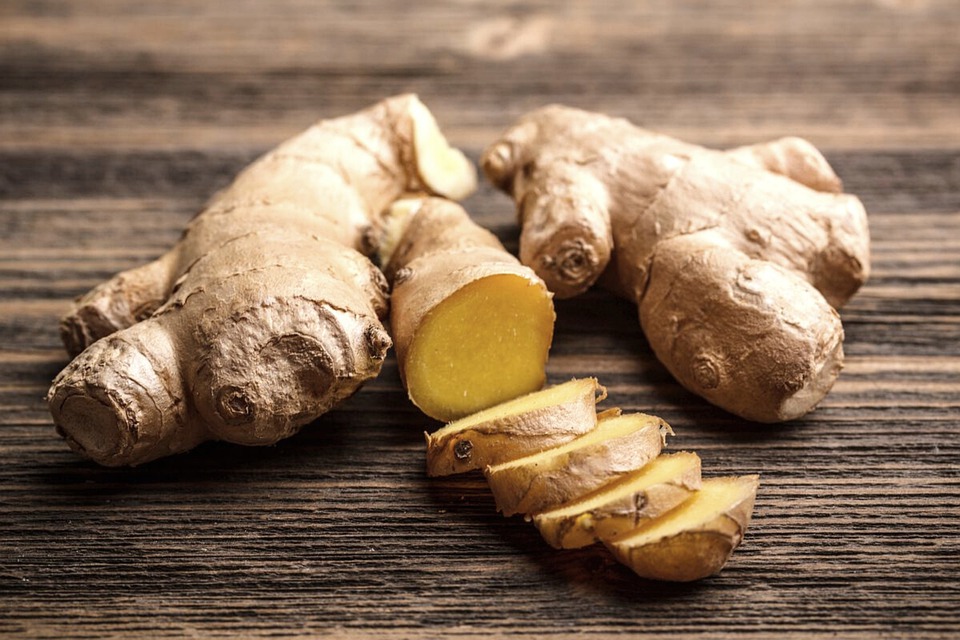
Source: Pexels.com
Ginger is a well-known herbal remedy with many beneficial properties to overcome respiratory problems. It is known to possess anti-inflammatory activity due to the presence of antioxidants. In addition to that, ginger can act on the smooth muscles of the respiratory tract and cause broncho relaxation. Simply ginger can be added to once diet as a flavoring agent, as a spice or as a beverage. (13), (16)
6. Turmeric
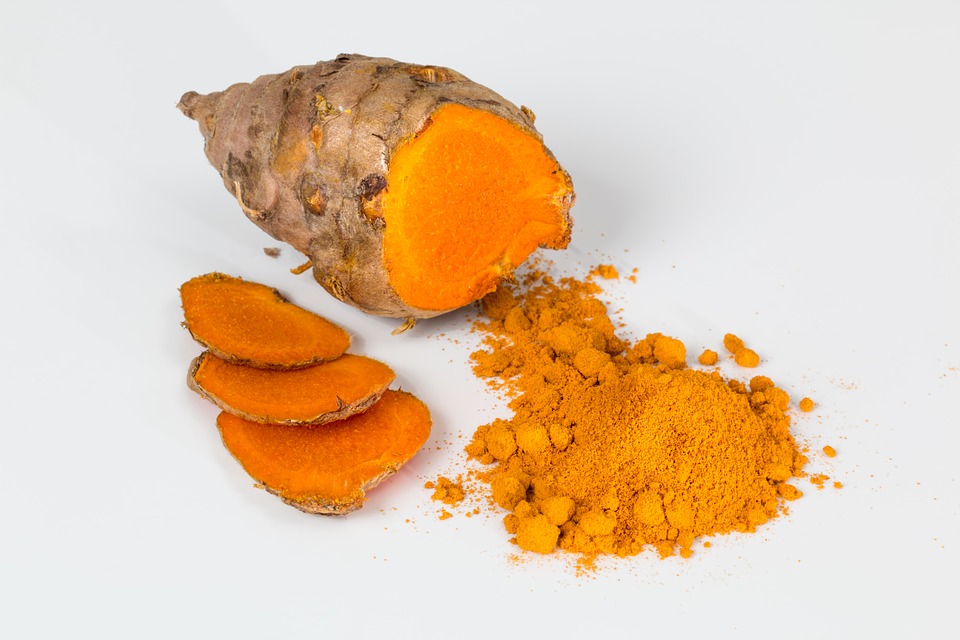
Source: Pexels.com
The main active chemical compound present in turmeric is curcumin. Curcumin is responsible for the anti-inflammatory and antioxidant properties of turmeric. Also, it can lower the airway inflammation that characterizes asthma. In a study published in the August 2014 “Issue of the Journal of Clinical and Diagnostic Research”, showed that adults with asthma who took 500 milligrams (mg) of curcumin daily for 30 days showed less airway obstruction compared to the controlled group. Turmeric can be added to once diet as a spice or as a beverage like tea. (17), (18)
7. Honey

Source: Pexels.com
Honey is a rich source of wide varieties of nutrients. The sweet taste of honey stimulates salivary glands and produces more saliva. This saliva acts as a lubricant of the airway and promotes the flow of air and ease the cough. Due to the above properties, honey is known as a cough suppressant. Moreover, honey can reduce the inflammation of the airway by removing the mucus in the lungs.
There are different ways in which honey can be used to relieve respiratory problems. One tablespoon of honey can be mixed with hot water and use as a beverage to remove mucus from the respiratory tract. In addition to that, honey can be mixed with turmeric and drink twice a day to avoid the symptoms of breathlessness. Also, another drink can be prepared by adding overnight soaked fenugreek seeds to a cup of water with ginger juice and a few drops of honey. This drink helps to detoxify the lungs to reduce the risk of unwanted respiratory complications. (19), (20)
8. Caffeinated drinks

Source: Pixabay.com
Caffeine is an important ingredient found in coffee, tea, cola drinks, and cocoa. Drinks including caffeine are “caffeinated drinks”. Caffeine is known to be a weak bronchodilator that improves lung functions. So drinking caffeinated drinks in moderate amounts will help to relieve the respiratory problems. (21), (22)
9. Beans

Source: Pexels.com
Particularly, beans contain prebiotics which helps reduce the risk of exercise-induced asthma. Prebiotics are indigestible plant fibers that help to grow healthy microbes in the gut. It will reduce the inflammatory response of the airway in asthmatic patients and reduce the severity of exercise-induced asthma. (23), (7)
10. Flax seeds
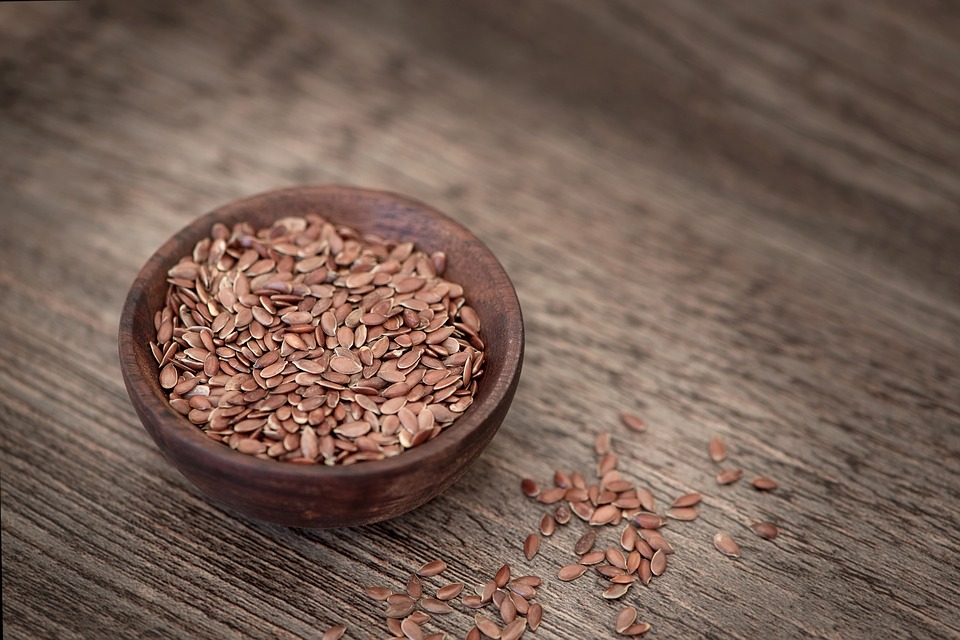
Source: Pixabay.com
Another good source of anti-inflammatory omega-3 fatty acids is flaxseeds. Furthermore, they contain magnesium that relaxes the muscles surrounding the bronchioles of the respiratory tract. The ground flaxseeds are known to be more effective. The ground powder can be easily added to smoothies or cereals, or sprinkle on salads. (24), (18), (25)
11. Fatty fish

Source: Pexels.com
Omega- 3 fatty acids play an important role in reducing inflammation associated with asthma. Fatty fish like salmon, mackerel, sardines, tuna, and trout are known to enrich with healthy fatty acids like omega-3. Having these fish frequently will help to reduce inflammation and alleviate respiratory problems. (18)
12. Nuts
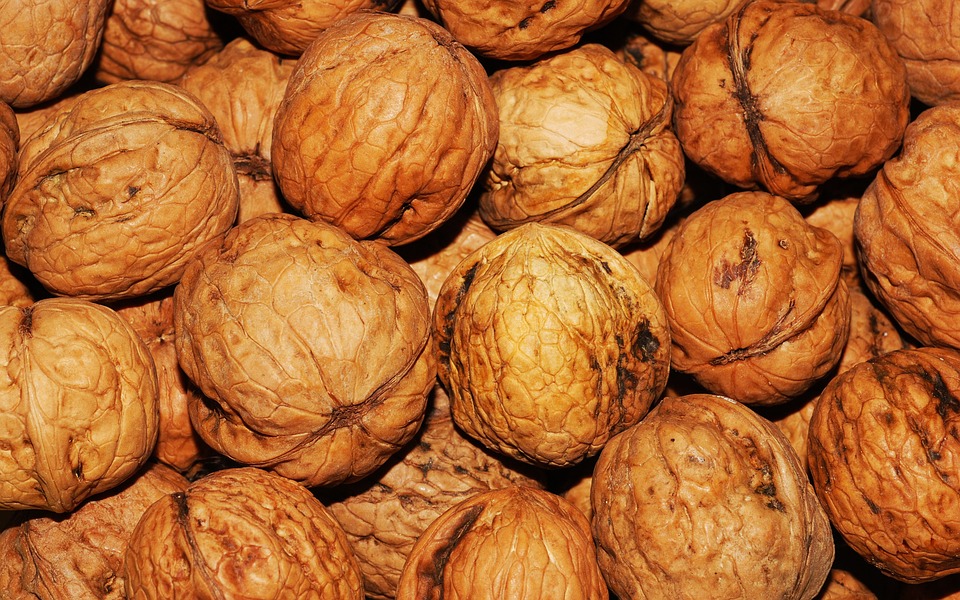
Source: Pixabay.com
Nuts are loaded with vitamin E. Gamma-tocopherol, a kind of vitamin E found in nuts, has proven the benefits of them over the symptoms of difficulty breathing. Vitamins can reduce the level of mucus present in the lungs and reduce the discomfort. These health benefits are prominent in walnuts, pecans, and peanuts. (26), (13)
13. Dairy products
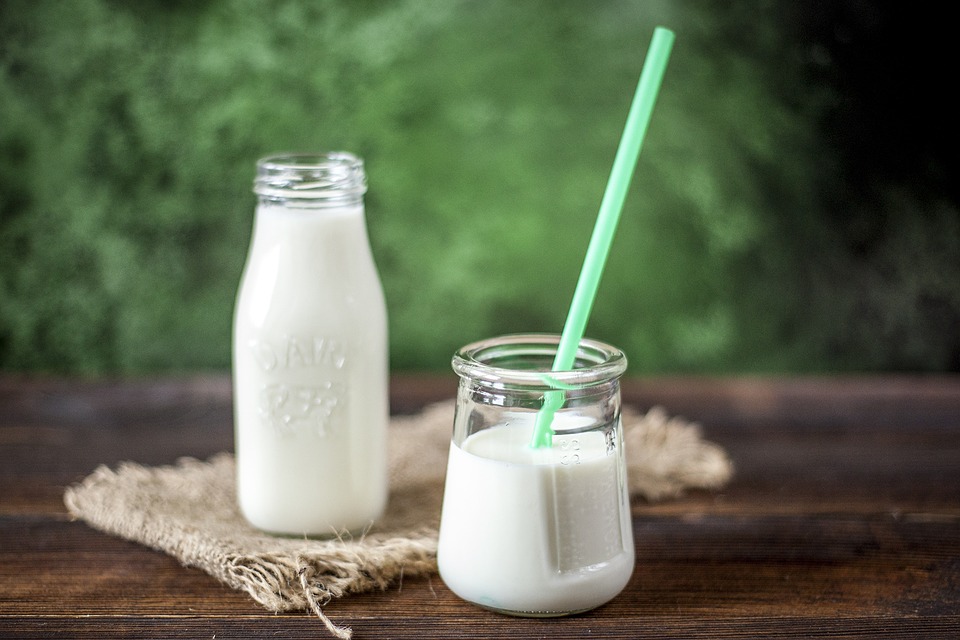
Source: Pixabay.com
If you are not identified with an allergy to dairy products, they will not lead to asthma. Studies also confirm that dairy products do not aggravate asthma symptoms or make them worse. Reduced vitamin D level of the body leads to an increase in the risk of upper respiratory tract infections. Milk products are rich with vitamin D, calcium, and fatty acids. Dairy products like milk, yogurt, and butter are vitamin D rich dairy products. (13), (27)
14. Garlic

Source: Pexels.com
Garlic is one of the best home remedies to treat respiratory problems. Vitamin C found in garlic plays an important role in alleviating symptoms of asthma. Vitamin C reduces histamine release and neutralizes free radicals that constrict the smooth muscles of the airway. Moreover, garlic can boost the body to produce prostacyclin. Prostacyclin opens up the airway and promotes easy breathing. Therefore adding garlic to once diet in a moderate amount will help to relieve respiratory problems. (28), (29), (18)
15. Eggs
Eggs are a good source of vitamin D if you are not identified with allergy eggs. Vitamin D reduces the frequency of asthmatic attacks in children ages 6-15. (13)





